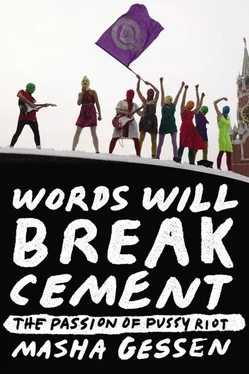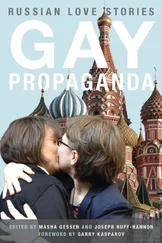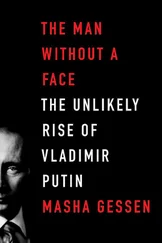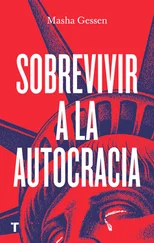In June, Oleg Vorotnikov donned the long black robe of a Russian Orthodox priest and a police officer’s hat, entered a supermarket, and left with a full cart of groceries but without paying—to demonstrate that both priests and cops were robbers. This was called Cop in a Priest’s Cassock.
In September, Voina staged one of its most loaded and confusing actions, which was also destined to be among its best remembered. Called In Memory of the Decembrists , the action referenced Russia’s nineteenth-century would-be revolutionaries in a decidedly obscure way. Five of the Decembrists had been hanged, so Voina staged the hanging of five men—three representing, in costume and makeup, migrant laborers and two representing homosexuals (one of whom was also Jewish in real life)—in the aisles of the Auchan hypermarket, which represented itself, unbridled consumerism, and a signature accomplishment of Moscow’s mayor, who was known for his xenophobic remarks. Auchan customers were handed “hunting licenses,” cards that purported to grant them the right to shoot migrant workers.
In November, on the anniversary of the October Revolution (which also happened to be Nadya’s nineteenth birthday), they staged their Storming of the White House. Voina smuggled a powerful laser projector into the attic of the Ukraine Hotel (another Stalin skyscraper) and used it to project an enormous skull-and-crossbones across the Moscow River onto the White House, seat of the Russian government.
They closed out the year on December 28 by welding shut the doors of Oprichnik, one of Moscow’s most ridiculously expensive restaurants, whose name referred to members of Ivan the Terrible’s shock troops. A message nailed to the door said: “For the security of our citizens the doors of the elite club Oprichnik have been reinforced.” Voina members had thought a New Year’s celebration was under way inside when they welded the club shut. In fact, Oprichnik was empty that night.
———
THEY PROVED TO BE TALENTED RECRUITERS. They would attend shows at Moscow’s Rodchenko School of Photography and invite gifted students to come and play—this was how a short, boyish young woman who called herself Kat became a regular participant. They would go to established artists for counsel and involve them as well: Kulik joined them occasionally, and a writer named Alexei Plutser-Sarno became the group’s quasi-official blogger and the leading source of information on their actions. A filmmaker named Tasya Krugovykh came to them when she needed a consult on shoplifting for a film she was planning—and they came back to her with a request for scripting one of their actions. She agreed.
Shoplifting was an essential part of the Voina ethos. They rejected consumption; more to the point, they had no money but liked to eat well and often—so they raised stealing food to an art form. They could hold forth for hours on the theory and practice of stealing to eat, including the finer details of stores’ unsuccessful shoplifting-prevention strategies.
Petya, Nadya, Oleg, Natalia, and a shifting number of other Voina members formed what amounted to a commune. They generally lived together—in a two-room apartment Petya was able to rent for a while, in Kulik’s basement studio where Anton the Crazy One lived, in a squat, in a rehearsal space. They traveled together when they had shows. They talked all the time, usually about art and politics. Eventually they tired one another out. In late 2009, they split acrimoniously—Oleg and Natalia and their allies on the one hand and Petya and Nadya and theirs on the other. Both groups continued to call themselves Voina. Oleg’s claim appeared to have more credence: his Voina continued to generate remarkable actions, including the group’s simplest and wittiest one, the laconic opposite of their early excesses. In June 2010, they painted the giant outline of a penis on half of a drawbridge outside the regional secret police headquarters in St. Petersburg. When the bridge was raised, the penis erected itself right into headquarters windows. The action was called Fuck the FSB . From this, Oleg’s Voina graduated to damaging and destroying police vehicles, then to getting arrested briefly, and finally to fleeing the country. Oleg and Natalia went into hiding in 2011 and eventually reemerged in Venice, Italy.
Nadya and Petya did not do anything as decisive or dramatic. They had had a baby: Gera happened to them much the way Nadya had happened to her own parents—Nadya was pregnant within months of meeting Petya. They scheduled a meeting with Andrei, Nadya’s father, in the Metro to tell him the news. He remembered sitting on a train pulling out of the station and realizing “there would be a baby and this character named Petya would now be a part of my life.” Once Nadya turned eighteen, she and Petya got a marriage license. Nadya was nine months pregnant when they “fucked for the heir puppy bear.” Gera was born four days later. The baby spent much of her time at Petya’s mother’s apartment while her parents were out making political art.
But by the time Gera was two, her parents—aged twenty and twenty-three—were a bit like art-world retirees. Their best or at least most dramatic work appeared to be behind them. Petya took to referring to Voina’s 2008 actions as “classics.” It seemed they had been a part of creating something much bigger than they had realized—and much bigger than they themselves were. But the moment in which that work had been created was over. The outrage was gone. The Marches of the Disagreeable had devolved into small protests in one of Moscow’s central squares, held every other month. The 2008 financial crisis had tamed Moscow’s consumerist extravagance. Medvedev kept spouting somewhat believable liberal rhetoric. What had been black and white turned an indecisive shade of gray—a color not conducive to making radical art.
Nadya studied. She looked for Russian translations of essential works of philosophy written during the last forty years; sometimes she found self-published or unpublished translations, and sometimes she found none at all and became a translator herself. Petya was restless.
“MY CHILDHOOD WAS not particularly ordinary before it became ordinary.” Yekaterina Samutsevich had an indirect relationship to language; I had noticed this in spending time in her company even before we sat down for our first formal interview. She aimed to be precise, her word choice was always intentional, but she seemed unaware of images or associations that her words called forth in others, and as a result her speech often served to obscure rather than to illuminate. Now I had told her I wanted to hear her whole story from the beginning, and she started by saying her childhood had become ordinary after it had been extraordinary.
“It was extraordinary at first because I was always in hospitals, in some sort of institution, like an orphanage but actually a hospital. I must have had serious health problems of some sort, as I was told later. So when I was a child, I never saw my parents. I don’t remember how old I was when I first saw them—it’s hard to tell the age from the memory. I remember Mother and Father came. Mother was wearing a black fur coat—I remember that. I was told, ‘This woman and this man are your parents. They waited for you and now they have come to take you.’ And I remember that I had been in hospitals and also there were other women I didn’t know. I lived at a woman’s home once and she gave me treatment potions. I had been spending all my time with strangers. So the first time I was shown my mother and father, it made no impression on me: I didn’t care who they were. I was just sad I had to go to some strange place. And they took me to the apartment where I still live.”
Читать дальше












